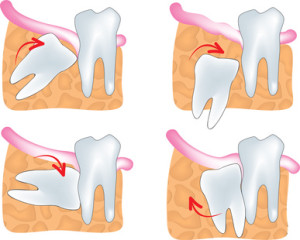Wisdom Teeth Removal
What are Wisdom Teeth?
A wisdom tooth is commonly known as a third molar because it appears as the third molar in each of the four quadrants. The common name is “wisdom teeth” because they appear so late – much later than the other teeth, at an age where people are presumably “wiser” than as a child when the other teeth erupt. Wisdom teeth usually erupt in the mouth between the ages of 17 and 25. Most people have four wisdom teeth, but it is possible to have fewer than four, more than four (also known as supernumerary teeth) or no wisdom teeth at all.
Many people believe that humans used to have larger jaws which were able to accommodate more teeth. As humans evolved, their jaws became smaller, but third molars still commonly develop in human mouths. Wisdom teeth are considered “vestigial,” because they no longer serve a purpose.
Do I Need Wisdom Teeth Removal?
Wisdom teeth commonly affect other teeth as they develop, becoming impacted or coming in sideways. Many times it’s best to remove the tooth coming in sideways especially if it’s causing damage to the tooth in the front. Wisdom teeth removal occurs because the teeth either have already become impacted, or they could possibly cause certain problems if not extracted. If they aren’t extracted they can also cause periodontal problems and cavities.

Wisdom teeth can also cause other problems which require the teeth to be extracted, including:
- Infections caused by bits of food trapped in the jaw area behind the wisdom teeth where conventional brushing and flossing is difficult and ineffective
- Misalignment which rubs up against the tongue or cheek causing pain
- Potential crowding or malocclusion of teeth
How To Prepare
Before a wisdom tooth extraction an evaluation and overview with Dr. Kim will be discussed to prepare for the procedure…
- A comprehensive dental exam will be done including dental X-rays taken and models made of your teeth and mouth. You also may need a special type of computed tomography (CT) scan, that will allow the dentist to accurately measure the height and width of your existing bone to evaluate the health of your teeth and jaw bone.
- Treatment plan. 212 Smiling will tailor a treatment plan to account all factors of the procedure. If the surgery is invasive we will take into account the factors and the procedure with a timely thought out plan. This will include a walkthrough of the procedure, a step by sept treatment guide and a follow up an appointment if needed.
Make sure to tell your doctor about any medical conditions and any medications you take, including prescription and over-the-counter drugs and supplements. If you have heart conditions or orthopedic implants, your doctor may prescribe antibiotics before surgery to help prevent infection.
Anesthesia may be used to control the pain during your procedure. The 212 Smiling team will instruct you about eating and drinking before surgery, depending on the type of anesthesia. If general anesthesia is used, someone will have to assist you home after surgery and expect to rest for the day.
What is the Wisdom Teeth Removal Procedure?
The dentist will usually take x-rays and do an exam to determine if the wisdom teeth are impacted or if there is an infection in the mouth. If you have any infections, surgery will usually be delayed until the infection has cleared up. Your dentist may have you take antibiotics to help heal the infection.
Before wisdom teeth removal, your dentist will give you a local anesthetic to numb the area where the tooth will be removed. You may also choose to have a form of oral sedation dentistry, which prevents pain in the whole body and will cause you to sleep through the procedure. Your dentist will probably recommend that you don’t eat or drink after midnight on the night before surgery so that you are prepared for the anesthetic.
To remove the wisdom tooth, your dentist will open up the gum tissue over the tooth and take out any bone that is covering the tooth. He or she will separate the tissue connecting the tooth to the bone and then remove the tooth. Sometimes the dentist will cut the tooth into smaller pieces to make your wisdom teeth extraction easier.
After wisdom teeth surgery, you may need stitches. Some stitches dissolve over time and some have to be removed after a few days. Your dentist will tell you whether your stitches need to be removed or not. A folded cotton gauze pad placed over the wound will help stop the bleeding.
What is the Recovery Like for Wisdom Teeth Removal?
Recovery from wisdom tooth extractions depends on the type of extraction performed. In most wisdom tooth removals some pain and swelling are anticipated. These post-op recovery related to extraction can be managed following the standard dental aftercare instructions. You may experience some of the typical discomforts associated with any type of dental procedure, such as:
- Minor bleeding
- Swelling
- Bruising
- Pain or discomfort
If there is anything unique that you need to follow your dentist will let you know. If swelling, discomfort or any other problem gets worse after surgery, contact your dentist as you may need pain medications or antibiotics. You may need to eat soft foods while the procedure site heals. Typically, your dental surgeon or dentist will use stitches, if invasive, that dissolve on their own, but if not your dental surgeon or dentist will have to remove them.


